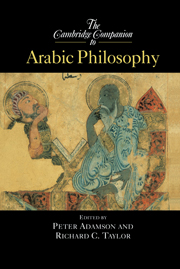Book contents
- Frontmatter
- 1 Introduction
- 2 Greek into Arabic
- 3 Al-Kindī and the reception of Greek philosophy
- 4 Al-Fāarābī and the philosophical curriculum
- 5 The Ismāīlīs
- 6 Avicenna and the Avicennian Tradition
- 7 Al-Ghazālī
- 8 Philosophy in Andalusia
- 9 Averroes
- 10 Suhrawardī and Illuminationism
- 11 Mysticism and philosophy
- 12 Logic
- 13 Ethical and political philosophy
- 14 Natural philosophy
- 15 Psychology
- 16 Metaphysics
- 17 Islamic philosophy and Jewish philosophy
- 18 Arabic into Latin
- 19 Recent trends in Arabic and Persian philosophy
- Select bibliography and further reading
- Index
12 - Logic
Published online by Cambridge University Press: 28 May 2006
- Frontmatter
- 1 Introduction
- 2 Greek into Arabic
- 3 Al-Kindī and the reception of Greek philosophy
- 4 Al-Fāarābī and the philosophical curriculum
- 5 The Ismāīlīs
- 6 Avicenna and the Avicennian Tradition
- 7 Al-Ghazālī
- 8 Philosophy in Andalusia
- 9 Averroes
- 10 Suhrawardī and Illuminationism
- 11 Mysticism and philosophy
- 12 Logic
- 13 Ethical and political philosophy
- 14 Natural philosophy
- 15 Psychology
- 16 Metaphysics
- 17 Islamic philosophy and Jewish philosophy
- 18 Arabic into Latin
- 19 Recent trends in Arabic and Persian philosophy
- Select bibliography and further reading
- Index
Summary
A chapter on logic in an introductory book on Islamic philosophy could legitimately be expected to cover a range of topics, from the argument techniques used by ninth-century theologians and jurists to the semantical analyses of the fourteenth-century grammarians. But by the late tenth century, the Arabic word commonly translated as “logic,” mantiq, had come to refer almost exclusively to Peripatetic traditions of distinguishing a good from a bad argument, and those are the traditions to which this chapter is limited. This means that the Arabic logical writings examined here are, like their medieval Latin counterparts, concerned with a problematic arising from the Aristotelian texts; more than medieval Latin logic, however, the dominant tradition of Arabic logic is mainly at one remove from those texts, as will be exemplified below.
Even with this limitation, the writings which fall under the chapter’s remit stretch from 750 to the present day, covering the whole course of subjects developed in the Organon. For practical purposes, I impose the further limitation of referring the material covered back to al-Risāla al-shamsiyya, the Logic for Shams al-Dīn by Najm al-Dīn al-Kātibī (d. 1276). I do so because down to the twentieth century it was commonly the first substantial text on logic which a Sunnī Muslim would study in the course of a madrasa education. Because the problematic considered by the Shamsiyya acquired its precise form in Avicenna’s writings, and acquired its commonly accepted resolution by the late thirteenth century, I will not consider any logical work written after this time. This should not be taken to imply that original work in logic came to an end in 1300, but rather that other problems had taken center stage.
- Type
- Chapter
- Information
- The Cambridge Companion to Arabic Philosophy , pp. 247 - 265Publisher: Cambridge University PressPrint publication year: 2004
- 7
- Cited by

